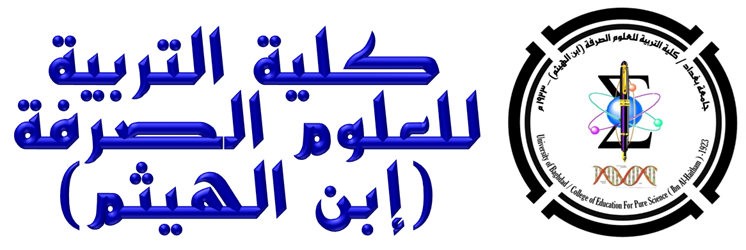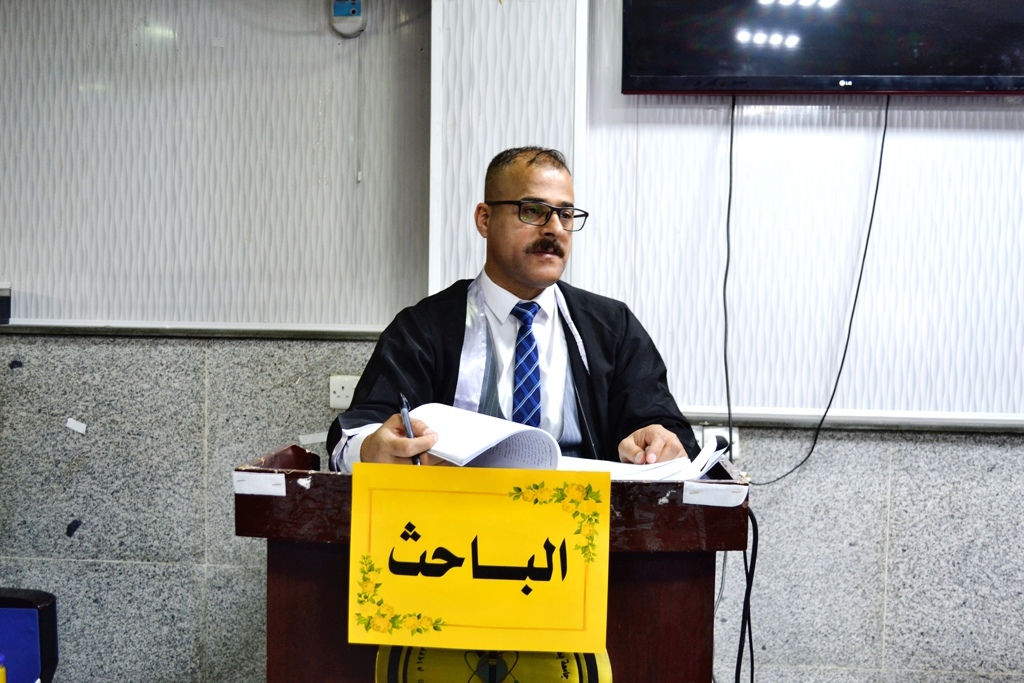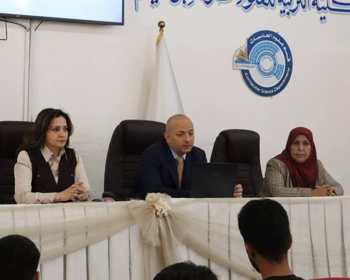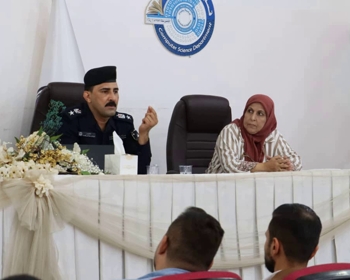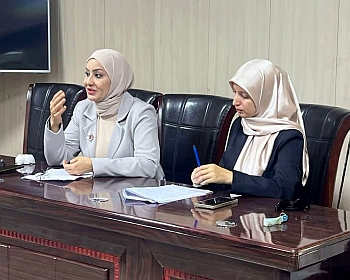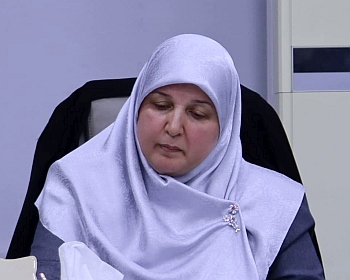ناقش قسم علوم الحياة في كلية التربية للعلوم الصرفة (ابن الهيثم) (بناء برنامج تـدريبي وفقاً لأنموذج TPACK وأثره في الأداء التدريسي لمدرسي مادة علم الأحياء والتفكير التنسيقي لطلبتهم) للطالب ( لؤي علي حسين) في تخصص (طرائق تدريس علوم الحياة )التي انجزها تحت اشراف التدريسية في القسم (أ.د. نادية حسين يونس) و نوقشت من قبل أعضاء لجنة المناقشة المبينة أسمائهم فيما يأتي :
أ.د. احمد عبيد حسن (رئيسا)
أ.د. رعد محمود نصيف (عضوا)
أ.د. علي رحيم محمد (عضوا)
أ.م.د. سالم عبد الله سلمان (عضوا)
أ.م.د. حسام يوسف صالح (عضوا)
أ.د. نادية حسين يونس (عضوا ومشرفا)
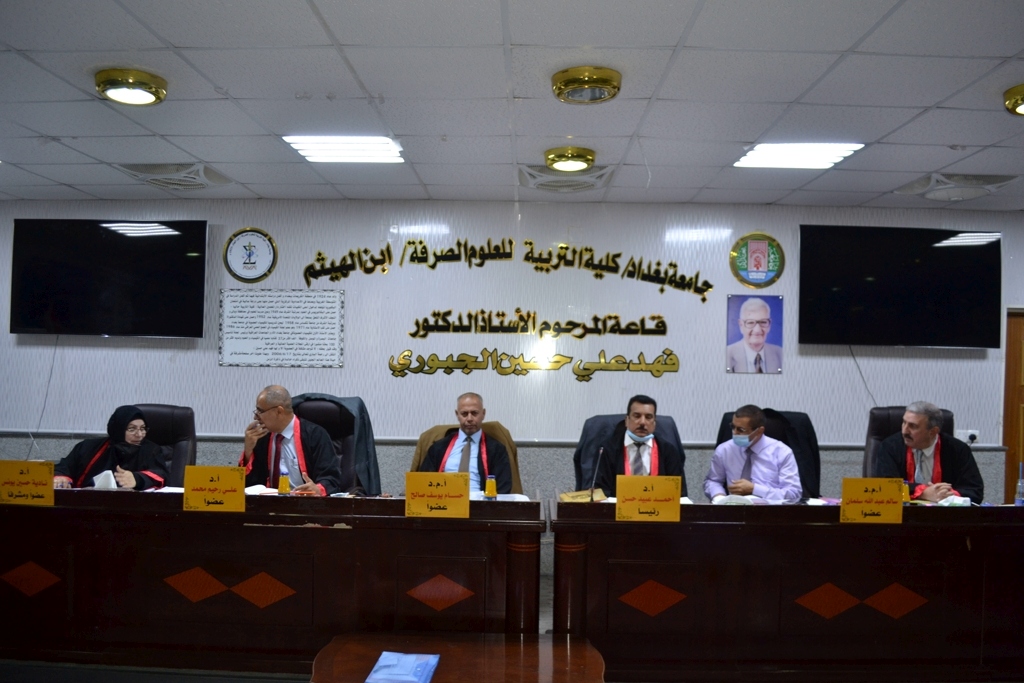
هدف البحث إلى تحقيق الآتي :
-
بناء برنامج تدريبي وفقاً لأنموذج TPACK لمدرسي مادة علم الأحياء للصف الرابع العلمي.
-
التعرف على اثر تدريب مدرسي مادة علم الأحياء على وفق البرنامج التدريبي في:-
-
الأداء التدريسي على وفق معايير NSTA لمدرسي مادة علم الأحياء للصف الرابع العلمي.
-
التفكير التنسيقي عند طلبة الصف الرابع العلمي .
للتحقق من الهدف الثاني للبحث صيغت الفرضيات الآتية:
-
لا يوجد فرق ذو دلالة إحصائية عند مستوى (0.05) بين متوسط درجات مدرسي المجموعة التجريبية الذين خضعوا للبرنامج التدريبي وفقاً لأنموذج TPACK ومتوسط درجات مدرسي المجموعة الضابطة الذين لم يخضعوا للبرنامج التدريبي في الأداء التدريسي على وفق بطاقة الملاحظة لمعايير NSTA.
-
لا يوجد فرق ذو دلالة إحصائية عند مستوى (0.05) بين متوسط درجات مدرسي المجموعة التجريبية الذين خضعوا للبرنامج التدريبي وفقاً لأنموذج TPACK والوسط الفرضي للأداء التدريسي وفق بطاقة الملاحظة لمعايير NSTA.
-
لا يوجد فرق ذو دلالة إحصائية عند مستوى (0.05) بين متوسط درجات مدرسي المجموعة الضابطة الذين لم يخضعوا للبرنامج التدريبي وفقاً لأنموذج TPACK والوسط الفرضي والوسط الفرضي للأداء التدريسي وفق بطاقة الملاحظة لمعايير NSTA.
-
لا يوجد فرق ذو دلالة إحصائية عند مستوى (0.05) بين متوسط درجات طلبة مدرسي المجموعة التجريبية الذين خضعوا للبرنامج التدريبي وفقاً لأنموذج TPACK ومتوسط درجات طلبة مدرسي المجموعة الضابطة الذين لم يخضعوا للبرنامج التدريبي في اختبار التفكير التنسيقي.
اعتمد الباحث التصميم التجريبي ذا المجموعتين التجريبية والضابطة ذي الضبط الجزئي لقياس الأداء التدريسي وفقاً لمعايير NSTA لمدرسي مادة علم الأحياء واختبار التفكير التنسيقي لطلبتهم.
إذ تمثل مجتمع البحث بمدرسي مادة علم الأحياء للصف الرابع العلمي التابعين لمديرية تربية بغداد الكرخ/3, أما مجتمع الطلبة فتمثل بجميع طلبة الصف الرابع العلمي في المدارس الإعدادية والثانوية التابعة للمديرية العامة لتربية بغداد الكرخ/3, للعام الدراسي (2020-2021).
إذ تم اختيار عينة البحث للمدرسين عشوائياً البالغ عددهم (34) مدرساً ومدرسة من مدرسي مادة علم الأحياء للصف الرابع العلمي من المدارس الإعدادية والثانوية التابعة للمديرية العامة لتربية بغداد الكرخ/3, وتم استبعاد (4) مدرسين لعدم حضورهم قبل البدء بالبرنامج, فأصبح العدد (30) مدرساً ومدرسة وزعوا عشوائياً بين مجموعتين إحداهما تجريبية بواقع (15) مدرساً ومدرسة خضعوا للبرنامج التدريبي, والأخرى ضابطة بواقع (15) مدرساً ومدرسة لم يخضعوا للبرنامج التدريبي, وتم إجراء التكافؤ لمتغيرات(المؤهل العلمي, وسنوات الخدمة, والدورات التدريبية, والجنس)، أما مجتمع البحث كان لطلبة الصف الرابع العلمي في المدارس الإعدادية والثانوية التابعة لمديرية العامة لتربية بغداد الكرخ /3, للعام الدراسي (2020 – 2021) الذين شمل مدرسوهم بعينة البحث, وبعد أن تم تحديد عدد الشعب وعدد الطلبة لكل مدرس ومدرسة إذ بلغ العدد الكلي للطلبة (3000) طالباً وفقاً لإحصائيات قسم التخطيط شعبة الإحصاء التابع للمديرية العامة لتربية بغداد الكرخ/3, لذا تم تحديد حجم العينة بالاعتماد على نسبة 10% لكل مدرس ومدرسة لمجموعتي البحث, وتمت مكافأتهم في متغيري (العمر الزمني والذكاء).
تم بناء البرنامج التدريبي وفقاً لأنموذج TPACK بالاعتماد على منحى النظم) المدخلات, العمليات, والمخرجات, والتغذية الراجعة)، وتم عرض البرنامج على عدد من المحكمين المختصين في مجال طرائق تدريس العلوم للتحقق منه قبل البدء بالتطبيق؛ للإفادة من ملاحظاتهم وآرائهم وإجراء التعديلات المناسبة في ضوئها, إذ طبق البرنامج التدريبي على المجموعة التجريبية باستخدام Free Conference Call (Fcc), إذ تضمن (عشرين) جلسة تدريبية زمن الجلسة الواحدة (ساعة ونصف الساعة) بينهما مدة استراحة لمدة (10 دقائق).
قام الباحث بتبني أداة البحث المتمثلة ببطاقة ملاحظة معايير NSTA لأداء مدرسي مادة علم الأحياء المؤلف من خمسة معايير ( المحتوى المعرفي, والمحتوى التربوي, والبيئة التعليمية, والسلامه, والتأثير في تعلم الطلبة), وتم عرضه على مجموعة من المحكمين, وتم استخراج الصدق والثبات, و أصبحت بطاقة الملاحظة بصورتها النهائية تتألف من (50) فقرة موزعة بين المعايير الخمسة, والأداة الثانية تمثلت باختبار التفكير التنسيقي لطلبة الصف الرابع العلمي, إذ شملت على (41) فقرة موزعة بين مهارات التفكير (التباعدي, والتحليلي, والتركيبي, والنسقي, والعلمي, والناقد), وتم التحقق من صدق الاختبار بعد عرضه على المحكمين واستخراج صدق البناء ومعامل الثبات للاختبار.
ولأجل استخراج نتائج البحث تم الاستعانة بالحزمة الإحصائية للعلوم الاجتماعية (SPSS), إذ اعتمد الباحث الوسائل الإحصائية ( الاختبار التائي لعينتين مستقلتين t-test, ومعامل ارتباط بيرسون, ومعامل ألفا كرونباخ, ومعادلة معامل الصعوبة ومعامل التمييز) .
تم تطبيق بطاقة ملاحظة معايير NSTA على مدرسي مادة علم الأحياء للمجموعتين التجريبية والضابطة وكذلك اختبار التفكير التنسيقي لطلبتهم في الكورس الدراسي الأول للعام (2020-2021), وبعد معالجة البيانات إحصائياً أظهرت النتائج تفوق مدرسي مادة علم الأحياء للمجموعة التجريبية الذين خضعوا في البرنامج التدريبي على مدرسي مادة علم الأحياء للمجموعة الضابطة الذين لم يخضعوا للبرنامج التدريبي في بطاقة الملاحظة وفقاً لمعايير NSTA, وتفوق طلبة مدرسي المجموعة التجريبية على طلبة مدرسي المجموعة الضابطة في اختبار التفكير التنسيقي.
وفي ضوء نتائج البحث توصل الباحث عدداً من التوصيات والمقترحات منها:
-
اعتماد البرنامج التدريبي المقترح على وفق أنموذج TPACK في برامج تدريب مدرسي مادة علم الأحياء في أثناء الخدمة لتطويرهم مهنياً بما ينسجم وحاجاتهم التدريبية والتطور العلمي والتكنولوجي.
إجراء دراسات مماثلة لمراحل دراسية أخرى, ولاختصاصات مختلفة.
By Construction of a training program according to the TPACK model and its impact in the teaching performance of biology teachers &coordination thinking for their students
By Luai Ali. H. AL-Hassan
Supervised by Prof.Dr.Nadia H.Younis Al-Afoon
Research Abstract
The aim of the research is to achieve the following
Developing a teacher fourth-grade biology training program based on the TPACK model
Determine the impact of training biology teachers especially biology teachers on the proposed training program in biology
-
National Science Teachers Association (NSTA) Standards for Biology Teachers for Grade 4 Teaching Performance Standards
. Fourth-grade students’ coordination thought
In order to achieve the second research objective, the following hypotheses were formulated
There is no statistically significant difference at the level of (0.05) between the average grades of male participating in the training program according to the TPACK model and the average score of teachers who did not participate in the training program in the measure of teaching performance according to NSTA standards
There is no statistically significant difference between the average values of teachers involved in the training at the (0.05) stage software using the TPACK model and the NSTA criteria scale’s hypothetical mean
. There is no statistically significant difference between the average values teachers who did not participate in the study at the (0.05) stage The TPACK model and the hypothetical mean of the NSTA requirements scale were used to create a training program
. There is no statistically significant difference between the average scores of teachers who participated in the training at the (0.05) stage In the teamwork measure, the average scores of teachers who did not participate in the training program were compared to the average scores of teachers who did not participate in the training program.
The researcher accepted the experimental design, which included two groups: experimental and control, as well as a partial adjustment of the teaching output scale to NSTA standards for biology teachers who want to test their students’ teamwork thought skills.
The fourth-grade biology teachers from the Baghdad Education Directorate Al-Karkh /3, Al-Taji Department serve the research community, while the student community is represented by students from the Baghdad Education Directorate Al-Karkh / 3, Al-Taji Department For the academic year, the Baghdad Education Directorate Al-Karkh / 3, Taji section was represented by all students in the fourth scientific grade in Baghdad’s preparatory and secondary schools (2020- 2021).
Teachers for the study were chosen at random (34) teachers and one biology teacher for the fourth science grade) from Baghdad’s preparatory and secondary schools Education Directorate Al-Karkh / 3- Al-Taji branch, and (4) teachers were omitted for failing to attend before the program began, bringing the total number of teachers and schools to thirty The experimental group consisted of (15) teachers and schools who took part in the training program, while the control group consisted of (15) teachers and schools who did not take part in the training program and were compensated with variables (academic qualification, years of service, training courses, and gender).
The study group consisted of fourth grade students from the General Directorate of Education’s preparatory and secondary schools For the academic year, Baghdad Al-Karkh / 3- Al-Taji Department (2020-2021), after determining the number of people and the number of students per teacher and school, and after determining the number of people and the number of students per teacher and school, the quantity According to the Planning Department, Statistics Division of the Baghdad Education Directorate Al-Karkh / 3, the total number of students is (3000) For the experimental and control groups, size was calculated using a percentage of 10% for each teacher and school, and they were rewarded in both variables (chronological age and intelligence).The training software was developed using the TPACK model and a systems approach (inputs, processes, outputs, and feed back) to take advantage of their findings and The researcher then used the training program on the experimental group on the Free Conference Call (Fcc) program, which included (twenty) training sessions, each lasting one hour and a half, with a one-hour break in between (10 minutes).
The researcher used the NSTA Standards Scale for the Performance of Biology Teachers as a research tool, which consisted of five parameters (cognitive material, educational content, educational climate, protection, and effects on students’ learning), and it was submitted to a panel of arbitrators following the conclusion of the competition The scale was updated and used by the researcher, and truthfulness and accuracy were extracted, resulting in a final type of (50) items distributed across the five regions. The second method was to measure teamwork thinking skills for the researcher It was designed for fourth-grade science students and consisted of ( 41 ) items divided into thinking skills (divergent, analytical, and synthetic).
The Statistical Package for Social Sciences (SPSS) was used to derive the study findings (Pearson, Cronbach’s alpha coefficient, equation of difficulty coefficient, and coefficient of discrimination).
In the first academic course of the year, the NSTA standards scale was extended to biology teachers in both the experimental and control classes, as well as assessing their students’ teamwork thought skills (2020-2021).
The teachers / biology subject teachers in the control group who did not take part in the training program on the NSTA scale, The teaching performance of the experimental group of teachers according to NSTA standards is superior, and the teaching performance of the control group teachers according to NSTA standards is not achieved In the teamwork thought skills test, the students of the experimental group’s teachers outperformed the students of the control group’s teachers.
The researcher made a number of suggestions and proposals in light of the findings, including:
Incorporating the proposed training curriculum based on the TPACK model into in service biology teacher training programs in order to improve them professionally in accordance with their training needs as well as scientific and technical advancements.
– Doing a similar study with various levels of study and specializations.
